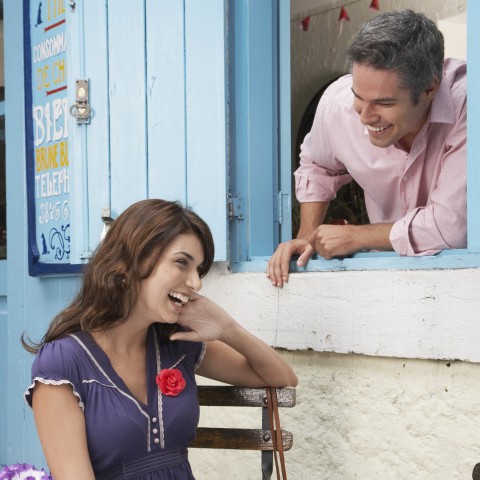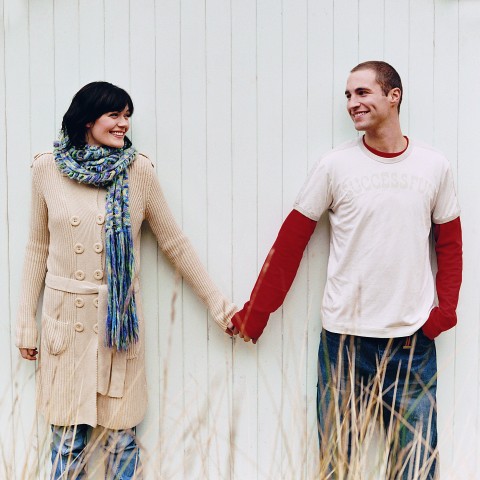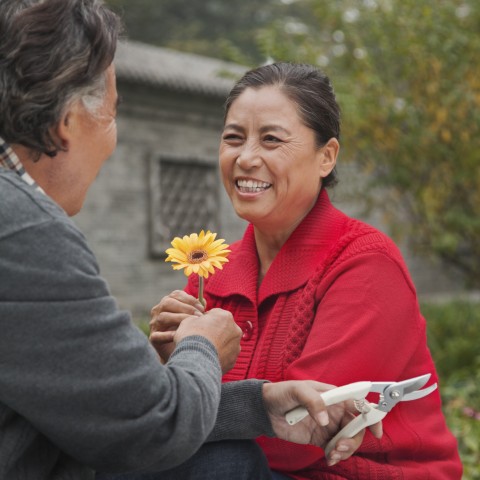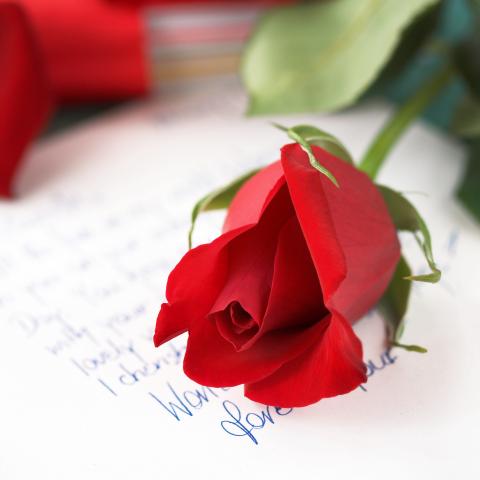
L’amour, die Liebe, die liefde, любовь (lyubov’)…all of these mean “love.”
Love is a universal language spoken mostly with the heart, but what a wonderful thing to express in any language!
Therefore, it makes sense that when people study to acquire a new language, one of the first things they learn (not long after hello and goodbye) is “I love you.” For some, being able to communicate with someone they love is their reason for learning the language in the first place!
If you’re wondering how to say “I love you,” in Afrikaans, then you’ve come to the right place. I’ve compiled for you a collection of Afrikaans love phrases you can use to express your feelings in no uncertain terms. Better still? It’s all framed in the context of a short, romantic story. Enjoy!
But before we continue—what is “love” in your native language? Tell us in the comments, please!
 Table of Contents
Table of Contents
- Pick-up Lines and the First Flush of Love
- Love Phrases for Long-Term Relationships
- Must-Know Love Quotes and Phrases
- Learn Afrikaans Phrases to Charm the Love of Your Life at AfrikaansPod101!

Liefde verander alles! / “Love changes everything!”
1. Pick-up Lines and the First Flush of Love
The hero of our story is named Jeffrey, and when Jeffrey moved to South Africa he was quite lonely at first. Therefore, he asked his Afrikaans friend Willem to take him to a good social venue where he might meet some nice single ladies.
But…he wondered how he would approach these local Afrikaans ladies to begin with. Online, he’d tried searching for things like ‘Afrikaans love phrases,’ but there were a lot of options and they didn’t really look like good pick-up lines. He was glad that Willem would be coming along to act as his ‘wingman.’
A. Keeping it Simple
The two of them were sitting at the bar when Jeffrey noticed a very attractive Afrikaans woman chatting with her friends. She shyly glanced his way every now and then, and he thought she looked approachable, but he still wondered what he should say to her. What would be a good Afrikaans pick-up line? He knew these could sometimes be cheesy and annoying, no matter which language you speak! Also, he wasn’t sure if there was a specific way to address an Afrikaans woman or not.

Wat sal ‘n goeie “pick-up line” in Afrikaans wees? / “What would be a good Afrikaans pick-up line?”
Eventually, he asked Willem for advice, saying, “I checked online but I didn’t know which line to choose. Can you help?”
Willem explained with a smile that there were many colorful (albeit rather lewd) Afrikaans pick-up lines online, and it was definitely not advisable to use any of those. Most Afrikaans ladies like to be courted in a more romantic, old-school kind of way—they prefer a gentleman’s approach.
“Keep it simple, be polite, and be straightforward,” Willem advised him.
Jeffrey asked for some examples of lines he could use and Willem thought for a bit, searching for the best lines of those he knew. Here are some polite but casual pick-up lines that Willem considered:
| Hello. My naam is Jeffrey. Mag ek vir jou ‘n drankie koop? Hello. My naam is Jeffrey. Gee jy om as ek by jou aansluit vir ‘n drankie? | “Hello. My name is Jeffrey. May I buy you a drink?” “Hello. My name is Jeffrey. Do you mind if I join you for a drink?” |
| One might be tempted to think that the above lines are quite formal, but what makes them casual is the pronoun used. In Afrikaans, if you were going to be formal, you would use the pronoun u instead of jy or jou. Let’s have a look at the same pick-up lines, but using the formal pronoun u.
This is a very formal way of talking and would seem out of place in a bar. For more information about this and other pronouns in Afrikaans, have a look at this article. | |
| Because they are in a bar and the setting is pretty informal, a slightly more flirtatious approach might also be suitable. No person is immune to sincere compliments! However, it would be best to read the situation and say what feels natural, because pick-up lines can be very cheesy, as I mentioned earlier. | |
| Haai daar. Jy’s wraggies baie mooi. | “Hi there. You are really beautiful.” |
| Dame, ek dink jy’s baie mooi en ek wil graag vir jou ‘n drankie koop. | “Lady, I think you’re very attractive and I’d like to buy you a drink.” |
| Gee jy om as ek hier sit? Jy’t my voete onder my uitgeslaan… | “Do you mind if I sit here? You’ve knocked me off my feet…” |
| Jammer as ek pla, maar ek wil net vir jou sê – jy slaan my asem weg! | “Sorry if I’m bothering you, but I just want to tell you—you take my breath away!” |
| Jy maak my knieë lam. Gee jy om as ek hier sit voor ek omval? | Literally: “You make me weak in the knees. Would you mind if I sit here before I fall?” |
| Wraggies, jy lyk bekoorlik. Mag ek vir jou a drankie koop? | “Really, you look enchanting. May I buy you a drink?” |

Jy slaan my asem weg! / “You take my breath away!”
Willem decided to stick to the polite but simple, straightforward approach, and suggested to Jeffrey that he say:
Hello. My naam is Jeffrey. Mag ek vir jou ‘n drankie koop? (“Hello. My name is Jeffrey. May I buy you a drink?”)
After practicing this line a few times, Jeffrey made his approach and delivered it to the beautiful woman at the bar. She did not seem offended, which was a good start, at least.
Jeffrey found out that her name was Charlize. He bought them more drinks and they chatted for almost an hour until she took a break to ‘powder her nose.’ He took the opportunity to hurry back to Willem and told him that it was going really well. He also wanted to know how he could tell Charlize that he really liked her and wanted to get to know her better. In his head, Willem quickly ran through all the Afrikaans love phrases that he could think of:
| Ek weet ons het nou net ontmoet, maar ek is reeds mal / gek oor jou. | “I know we’ve only just met, but I’m already mad about you.” |
| Jy’s regtig cool! Ek hou van jou!1 | “You are really cool! I like you!” |
| Hey, dit was nou lekker om met jou te gesels. Ek wil jou graag weer sien. Kan ek jou selnommer kry, asseblief? | “Hey, it was nice to chat with you. I would really like to see you again. Could I have your cell number, please?” |
| Ek dink jy is great en ek het jou geselskap baie geniet vanaand. Ek wil jou graag weer sien.1 | “I think you are great and I enjoyed our conversation a lot tonight. I’d like to see you again.” |
1) Both Afrikaans and English are spoken by a large portion of the population in South Africa. This means that even older folks mix the languages vernacularly. This “cross-contamination” is considered normal, and it’s usually suitable in casual, informal situations.
They were all good options, but in the end, Willem decided on a different one. He whispered it into Jeffrey’s ear and told him that this line was sure to win Charlize over. Jeffrey practiced it a few times, then went over to her again. When he delivered his line, she burst into laughter and blushed.
“Wait! What does My hart pomp tjoklit vir jou mean?” he asked her nervously. This was, of course, the line he had quoted.
She laughed again and told him that it means: “My heart is pumping chocolate for you.” When she saw how embarrassed he was, she assured him that it was quite a common, cute expression in Afrikaans. She just hadn’t expected it from him. Actually, it was quite sweet, she said, giving him a light kiss on the cheek to make him feel better.
Jeffrey glared at Willem, who grinned from ear to ear and gave him an encouraging thumbs-up.

Ek wil jou graag weer sien. Kan ek jou selnommer kry, asseblief? / “I would really like to see you again. Could I have your cell number, please?”
By the end of the night, Jeffrey and Charlize were quite comfortable with each other and she liked him enough to give him her number. They went on a few dates after that and Jeffrey’s feelings for her deepened. He went to Willem again to ask him for advice on how to tell Charlize that he wanted to take the relationship to the next level…
B. Taking it to the Next Level
Despite the fact that he and Charlize had been together for some months, Jeffrey had not yet learned how to say “I love you,” in Afrikaans. He was a naturally cautious fellow, but now he was ready to commit to a more serious relationship with this pretty, wonderful woman.

My lewe is soveel beter vandat ek jou ontmoet het. / “My life has been so much better since I met you.”
Once again, he turned to the web for insight. This time, he actually found some pretty good answers, but he still decided that he’d best ask Willem for ideas anyway.
When Willem heard that Jeffrey was getting serious about Charlize, he was happy for his friend and searched through his inner library of romantic expressions in Afrikaans to find just the right one for his friend to use. It was not an easy choice, because there are many, as you can see below:
| Sal jy my meisie wees? Note: This “asking out” question most often serves as a formality to seal a relationship. It denotes commitment, exclusivity, and the status of being a couple. Usually, it’s preceded by the Afrikaans love phrases in this column. However, in many modern relationships, especially among the younger generation, this step is skipped. After a few romantic dates and declarations of mutually passionate feelings, it’s assumed that you’re together as a couple. | “Will you be my girlfriend?” |
| Ek het romantiese gevoelens vir jou. | “I’ve got romantic feelings for you.” |
| Ek is verlief op jou. | “I am in love with you.” |
| Jy’t my hart heeltemal verower. (The word jy’t is a contraction of jy [“you”] and het [“have”]). | “You’ve conquered my heart completely.” |
| My lewe is soveel beter vandat ek jou ontmoet het. | “My life has been so much better since I met you.” |
| Jy is die godin van my hart. | “You are the goddess of my heart.” |
| Jy is kosbaar vir my en ek gee om vir jou. | “You are precious to me and I care about you.” |
| Jy is die enigste vis in die see vir my. | “You are the only fish in the sea for me.” |
| But what if the roles were reversed? Are there specific Afrikaans love phrases for her when it comes to asking someone to take it to the next level? The answer is “Yes!” Charlize would be able to say most of the phrases above in the exact same way, except for the gender-specific ones, of course. Let’s have a quick look at a few alternative phrases that Charlize could use. | |
| Sal jy my kêrel wees? | “Will you be my boyfriend?” |
| Jy is die ridder van my hart. | “You are the knight of my heart.” |
| Jy is my held. | “You are my hero.” |
| You’ve probably noticed that we haven’t yet looked at how to say “I love you,” in Afrikaans! It’s simply: Ek het jou lief. / Ek is lief vir jou. | |
The expression that Willem eventually suggested to Jeffrey was a combination of two of the expressions above. He suggested that Jeffrey say: Jy’t my hart heeltemal verower. Sal jy my meisie wees? (“You have conquered my heart completely. Will you be my girlfriend?”)

Ek is lief vir jou. / “I love you.”
Jeffrey took Charlize out on a romantic date and, just after their first glass of wine, he asked her the question. Charlize went quiet and Jeffrey wondered, for a moment, if Willem had tricked him again. But it turned out that Charlize was choking back happy tears. When she felt okay to speak again, she softly told Jeffrey that she felt the same way about him. Below are some Afrikaans love phrases for her that she could choose from as a reply.
| In Afrikaans, like in English, if you want to repeat a sentence or phrase back to someone, all you have to do is add the word ook (“too” / “also”) to what they said. | |
| Ek het gevoelens vir jou. (“I have feelings for you.”) | Ek het ook gevoelens vir jou. (“I also have feelings for you.”) |
| Ek is verlief op jou. (“I am in love with you.”) | Ek is ook verlief op jou. (“I am also in love with you.”) |
| Jy is die enigste vis in die see vir my. (“You are the only fish in the sea for me.”) | Jy is ook die enigste vis in die see vir my. (“You are also the only fish in the sea for me.”) |
Now that you know how to reciprocate what someone has said to you in Afrikaans, can you figure out how Charlize replied to Jeffrey after he said, Jy’t my hart heeltemal verower? It should be quite easy.
If you guessed that Charlize added ook to her sentence, then you were correct: Jy’t ook my hart heeltemal verower. Ek sal jou meisie wees. (“You have also conquered my heart. I will be your girlfriend.”)

Verwerping is soms baie moeilik om te hanteer. / “Rejection is sometimes very difficult to handle.”
C. Rejection
Sadly, things don’t always work out the way we hope they will when we ask someone to take it to the next level. Sometimes we discover that they don’t feel the same way, or that they’re not ready for an exclusive commitment yet. Happily, Jeffrey did not have to experience this, but what if Charlize had said no? How would she have phrased her rejection?
In Afrikaans, we make use of double negatives in order to negate an expression. To learn more about the grammar behind this, have a look at this article. What it means, in short, is that you add two negating words to the sentence, not unlike you would do in some English slang. For example:
| |
| Sal jy my meisie wees? (“Will you be my girlfriend?”) | Jammer, ek wil nie. Ek hou baie van jou maar ek is nie gereed vir ‘n vaste verhouding nie. (“Sorry, I don’t want to. I like you a lot but I am not ready for a steady relationship.”) |
| Ek is verlief op jou. (“I am in love with you.”) | Jammer, ek is nie verlief op jou nie. (“Sorry, I am not in love with you.”) |
| Ek het gevoelens vir jou. (“I have feelings for you.”) | Jammer, ek het nie dieselfde gevoelens vir jou nie. Maar kan ons vriende wees? (“Sorry, I don’t have the same feelings for you. But can we be friends?”) |
| Or, you could give a generic negative reply: Jammer, maar ek voel nie dieselfde oor jou nie. (“Sorry, but I don’t feel the same way about you.”) Tip: If you’re the one doing the let-down, then remember to do so gently and with respect and kindness. Rejection can be very hard to take, especially in matters of the heart. It would be best to stick with the Golden Rule—do to others as you would have them do to you! | |

Jy beteken die wêreld vir my. / “You mean the world to me.”
2. Love Phrases for Long-Term Relationships
If you, like Jeffrey, have experienced luck in love, then it’s time to learn some additional love phrases in Afrikaans you can use to strengthen and progress your relationship.
A. Phrases that help to keep a relationship strong:
Now that Charlize had agreed to be Jeffrey’s girlfriend, they were entering into a phase of the relationship where Jeffrey no longer had to woo her—but there was still work to be done.
I don’t know if you agree with me here, but I think that if we want a relationship to work, we have to put some effort into it. Fortunately, Jeffrey was the kind of person who did like to put effort into his relationship. Part of this included studying Afrikaans in his spare time. Naturally, he spent a lot of his study time researching romantic expressions in Afrikaans!
He found that Charlize was a very kind and considerate girlfriend and often did nice things for him, so one of the first things he learned to say was:
- Baie dankie. Ek waardeer alles wat jy vir my doen. (“Thanks a lot. I appreciate everything you do for me.”)
Sometimes he also wanted to tell her that he appreciated her for who she was, and not just for the things she did. So he learned to say:
- Jy beteken die wêreld vir my. (“You mean the world to me.”)

Baie dankie. Ek waardeer alles wat jy vir my doen. / “Thank you. I appreciate everything you do for me.”
And then, of course, there were those occasions when, no matter how considerate he was in general, he did something that required an apology. So he learned to say:
- Ek het ‘n fout gemaak; ek is jammer. (“I made a mistake; I’m sorry.”)
Charlize, it turned out, was also a very wise person, and he began to find that he really valued her input when it came to making decisions. He also cared about what she wanted, and for this reason, he learned how to say:
- Wat dink jy hiervan? (“What do you think about this?”)
- Wat is jou opinie? (“What is your opinion?”)
- Wat verkies jy? (“What do you prefer?”)
And then, of course, Jeffrey often used those two absolutely essential words in Afrikaans culture:
- Asseblief. (“Please.”)
- Dankie. (“Thank you.”)
This article explains exactly how to use these terms correctly in Afrikaans!
Charlize was also very good at using expressions like these and, despite the ups and downs that all relationships go through, they found that their relationship grew from strength to strength.

Sal jy my vrou wees, asseblief? / “Will you be my wife, please?”
B. Popping the Question
Two years after their first meeting, Jeffrey decided he was ready to pop the question! He had been studying Afrikaans almost daily, so he was pretty sure he knew how to ask Charlize to marry him, but he checked his books anyway. This was not the kind of thing you wanted to make a mistake with. He found some great expressions:
| Sal jy my vrou wees, asseblief? | “Will you please be my wife?” |
| Sal jy met my trou, asseblief? | “Will you please marry me?” |
| Ek wil my lewe saam met jou deurbring. | “I want to spend my life with you.” |
| Ek wil saam met jou oud word. | “I want to grow old with you.” |
| The following two expressions are not actually marriage proposals, but they would definitely make any marriage proposal that much more meaningful and beautiful. | |
| Ek het jou lief bo alles en almal. | “I love you above everything and everyone.” |
| ‘n Lewe sonder jou is vir my ondenkbaar. | “A life without you is unimaginable for me.” |
| As uncommon as it is in Afrikaans culture, it’s not unheard of that the woman might pop the question. So, if Charlize had wanted to be the one proposing, are there similar Afrikaans love phrases for her that she could have chosen from? The fact is that all of the above phrases can be used by both men and women, except for the first one. If she had been the one proposing, Charlize would have said: | |
| Sal jy my man wees, asseblief? | “Will you please be my husband?” |
One night, Jeffrey took Charlize out on a romantic adventure that included a day of fun, outdoor activities together, dinner at a fancy restaurant, and eventually a romantic stroll on a beautiful, moonlit beach. While they were walking along quietly on the wet sand, he suddenly stopped in front of her, dropped to one knee, and held up a small box that contained a gorgeous engagement ring. (Afrikaans girls tend to like old-style marriage proposals, remember!)

Ware liefde hou vir ewig. / “True love lasts forever.”
Combining two of the phrases he had learned, he said earnestly: “Charlize, ek wil saam met jou oud word. Sal jy met my trou, asseblief?” (“Charlize, I want to grow old with you. Please, will you marry me?”)
Of course, Charlize said ja (“yes”)!
C. Terms of Endearment
Another way of saying “I love you,” in Afrikaans, without actually using those words, is to use terms of endearment. During their engagement, Charlize and Jeffrey grew even closer and Charlize often used Afrikaans terms of endearment when talking to him. Jeffrey soon found himself beginning to emulate her.
In English, people use terms of endearment like “darling,” “baby,” or “honey.” Afrikaans people use these too, but they are spun in a uniquely Afrikaans way. It’s not easy to find a direct English translation for some of these; hence the literal translations that I have added. You’ll see that they have a very distinct character!
- my liefling (“my darling”) Lit. “my loveling”
- my skattebol (“my darling”) Lit. “my treasure ball”
- my skatlam (“my darling”) Lit. “my treasure lamb”
- my skat (“my treasure”)
- my liefste (“my beloved”)
- my enigste (“my only”)
- my lief (“my love”)
Other expressions Charlize sometimes used were:
- my lam (“my darling”) Lit. “my lamb”
- my ander helfte (“my other half”)
| Charlize and Jeffrey were still young and in a relatively new relationship, so they wouldn’t have used the following terms of endearment (except perhaps in a jocular way). However, for older people who have been in a relationship for a while and who have a strong sense of familiarity with each other, these are very common: | |
| ou ding / my ou ding | Lit. “old thing” / “my old thing” |
| my ou man / my ou vrou | “my old man” (also husband) / “my old woman” (also wife) |
| The use of ou in these phrases denotes both age and a sense of fond familiarity. A similar convention occurs in English when a speaker affectionately refers to their aging pet dog as, “my old doggie,” for instance. In this case, “old” carries connotations similar to those that the word ou does in Afrikaans when used as part of a term of endearment. However, make sure you’re using it in an appropriate context, meaning only with people you know very well. Please note that, in Afrikaans, man can mean “man” or “husband” and vrou can mean “woman” or “wife,” depending on the context. If the speakers are married, then the words connote the latter meaning. | |
Charlize and Jeffrey used these terms of endearment so often that they barely used each other’s names anymore. Everyone who knew them felt it was only right that they get married—they were so perfect for each other. Their wedding was something that everyone looked forward to.

Ek het die skoot hoog deur! / Approximate: “Love hit me hard!”
3. Must-Know Love Quotes and Phrases
Many times, the words of a poet, songwriter, or novelist can perfectly capture how we’re feeling. Below are some Afrikaans love quotes translated in English, each one written from the heart and sure to capture that of your lover…
A. The Power of Beautiful Words
In a relationship, we often share with our partner lyrics from songs we like or lines from our favorite poems. One of Charlize’s favorite poems was called Erens is jy (“Somewhere you are”), from the anthology Eerste Gedigte (“First Poems”), and it was written by her favorite Afrikaans poet Antjie Krog. Charlize’s favorite lines from the poem were:
| … as ek die dag my hand in joune sitsal ek my padkaarte bêre met die wete:my reis op soek na jou is nou verby. | “… the day I put my hand in yoursI will put away my maps with the knowledge:my journey in search of you is now over.” |
On the day of the wedding, Jeffrey stood in front of everyone and delivered his vows in Afrikaans with no mistakes at all. He knew that if he spoke his vows to Charlize in Afrikaans, they would be far more meaningful for her. After delivering his vows, he surprised everyone by clearing his throat nervously and then, in beautiful Afrikaans, recited a rendition of the poem his wife loved so much:
Ek sit, hierdie dag, my hand in joune
en bêre my padkaarte met die wete:
my reis op soek na jou is nou verby.
“I put, this day, my hand in yours
and stash away my roadmaps with the knowledge:
my journey in search of you is now over.”

Sonder jou liefde is die graaf te swaar vir my en val die geil reëns van die berge sonder doel. – D.J. Opperman.
“Without your love, the shovel is too heavy for me, and the abundant rain of the mountains falls without purpose.”
Charlize was deeply moved by his beautiful gesture and Jeffrey had to help her wipe away the tears there at the altar. Once she’d collected herself, the dominee (“pastor” / “minister”) married them and they kissed to raucous applause.
Oh, and—all of this was 25 years ago. They are still happily married.
B. Quotations that Inspire Love
If you wish to impress the Afrikaans person you love in the way that Jeffrey impressed Charlize, perhaps you’ll benefit from looking at these wonderful quotes from famous Afrikaans poets and singers.
| sonder jou liefde is die graaf te swaar vir my en val die geil reëns van die berge sonder doel. ~ D.J. Opperman | “without your love the shovel is too heavy for me and the abundant rain of the mountains fallswithout purpose.” |
| Ek stuur vir jou ʼn berggansveermits dese wil ek vir jou sêhoe diep my liefde vir jou lê ~ Boerneef 2 | “I send to you a wild goose featherwith which I want to tell youhow deep my love lies for you” |
| vye word suur, maar die liefde, die liefde is soeter as vye ~ Breyten Breytenbach | “figs turn sour, but love, love is sweeter than figs” |
| ek wil vir jou ʼn gewelhuisie bouin die boland van my hart……maar ek wil vir jou my lewe geein die wit afdophuisie van my hart… ~ André Letoit aka Koos Kombuis | Approximate: “I want to build for you a gabled housein the pastures of my heart……but I want to give you my lifein the white, dilapidated house of my heart…” |
| Die liefde is ʼn dubbeldoor—iets te wen en iets verloor. ~ Koos Du Plessis | Approximate: “Love is a contradiction—something to win and something to lose.” |
| Die liefde in my Die liefde in my Dis altyd jy, net altyd jy, die een gedagte bly my by soos skadu’s onder bome bly, net altyd jy, net altyd jy. Langs baie weë gaan my smart, blind is my oë en verward is alle dinge in my hart. Maar dit sal een en enkeld bly, en aards en diep sy laafnis kry, al staan dit winter, kaal in my, die liefde in my, die liefde in my. ~ NP van Wyk Louw | “The love in me, It’s always you, always only you, this one thought stays with me as shadows live under trees always only you, always only you. Along many roads my sorrow goes,blind are my eyes and confused are all things in my heart. But this one thing remains, which is nourished from deep within, even when it’s winter, naked in me, the love in me, the love in me.” |

Ek kan my nie ‘n lewe indink sonder jou nie. / “I can’t imagine a life without you.”
Which of these Afrikaans phrases resonates with you the most, and why? Let us know in the comments!
4. Learn Afrikaans Phrases to Charm the Love of Your Life at AfrikaansPod101!
At AfrikaansPod101, we can help you understand Afrikaans easily with our hundreds of recorded videos, themed vocabulary lists, and variety of learning and study tools. With our help, you’ll be able to use the phrases correctly and speak like a native in no time!
Also, you can start deciphering Afrikaans phrases yourself with the multiple tools we make available to you upon subscription, such as the Afrikaans Key Phrase List and the Afrikaans Core 100 Word List. You should also make sure to keep your Afrikaans online dictionary closeby for easy translation!
If Afrikaans vernacular is important to you, then take a look at the following pages on our website:
- The Best Afrikaans Internet Slang and How to Use it!
- How to Say “Hello” in Afrikaans Like a Native Speaker!
- How to Say I Love You in Afrikaans
Still hesitating? Don’t! Subscribe now, and you’ll be very happy you did!
About the author: Kurt Donald is an experienced writer and copy editor, and is currently based in Cape Town, South Africa.










